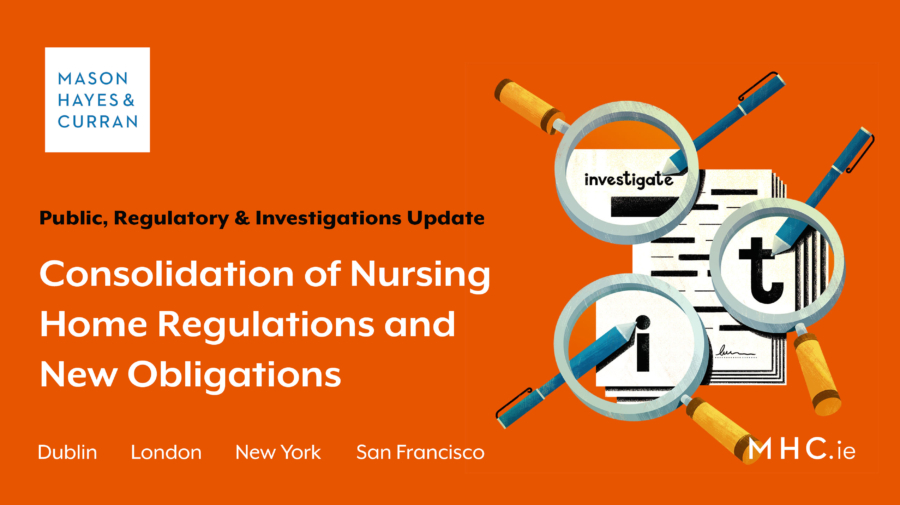
Informal, consolidated versions of the nursing home regulations have been prepared by the Department of Health.
As these regulations have been amended several times by separate sets of regulations, nursing home providers may find the consolidated versions useful to see all the changes in context. The consolidated versions also highlight new obligations to provide access to advocacy services and a complaints procedure. These obligations apply to nursing home providers since 1 March 2023.
Nursing home providers will be aware of their obligations under the below regulations:
- The Health Act 2007 (Care and Welfare of Residents in Designated Centres for Older People) Regulations 2013[1] (the 2013 Care and Welfare Regulations)
- The Health Act 2007 (Registration of Designated Centres for Older People) Regulations 2015[2] (the 2015 Registration Regulations)
These regulations were amended in 2016, 2017 and 2022. The consolidated versions combine all changes up to March 2023. However, their accuracy is not guaranteed by the Department, so it is best to use them as guidance, and always refer to the legislation, as enacted, for the definitive position.
Recent changes to the 2013 Care and Welfare Regulations
The most recent changes to the 2013 Care and Welfare Regulations are to bring in obligations on:
- Ensuring that residents have access to independent advocacy services, and
- Providing an accessible and effective complaints procedure
We set out below a summary of the key obligations that apply since 1 March 2023.
Independent advocacy services
An independent advocacy service is defined as advocacy support provided by an organisation that is free from conflict of interest and is independent of family and service providers. An example might be the Patient Advocacy Service. Nursing home providers must ensure residents can access in-person awareness campaigns provided by these services and can meet and receive support from them.
Complaints procedure and provider obligations
Nursing home providers must provide an accessible and effective complaints procedure, which:
- Nominates a complaints officer to investigate complaints and a review officer to review, on request, the complaints officer’s decision
- Sets maximum timeframes of 30 working days for the investigation of complaints and 20 working days for a review
- Requires a written response to the complainant about the outcome of their complaint or of a review
A nursing home provider is required to take reasonable steps to give effect, as soon as possible and to the greatest extent practicable, to any improvements recommended by the complaints or review officer. The provider must also:
- Make the resident aware of the complaints procedure and display a copy of it in a prominent area and, if applicable, on the provider’s website
- Offer or arrange for practical assistance, where necessary, so that the complainant can understand the complaints process, make a complaint, request a review or refer the matter externally, including to the Ombudsman
- Keep full and proper records concerning complaints
- Ensure nominated complaints and review officers receive suitable training, and all staff are aware of the procedure and how to identify a complaint, and
- Ensure that a resident has access, subject to legal requirements, to records and information in relation to the complaint, and is not adversely affected by the making of any complaint
Finally, the provider’s annual review of the standard of care provided to residents must now include a general report on the level of engagement of independent advocacy services, complaints received and reviews conducted.
Conclusion
Nursing home providers that have not already established a complaints procedure and provided for access to independent advocacy services should review the new requirements and take steps to become compliant. A recently published HIQA report on an unannounced inspection indicates that compliance with these requirements will be assessed by HIQA.
For more information on ensuring full compliance, contact a member of our Public, Regulatory & Investigations team.
The content of this article is provided for information purposes only and does not constitute legal or other advice.
[1] SI No 415 of 2013
[2] SI No 61 of 2015






